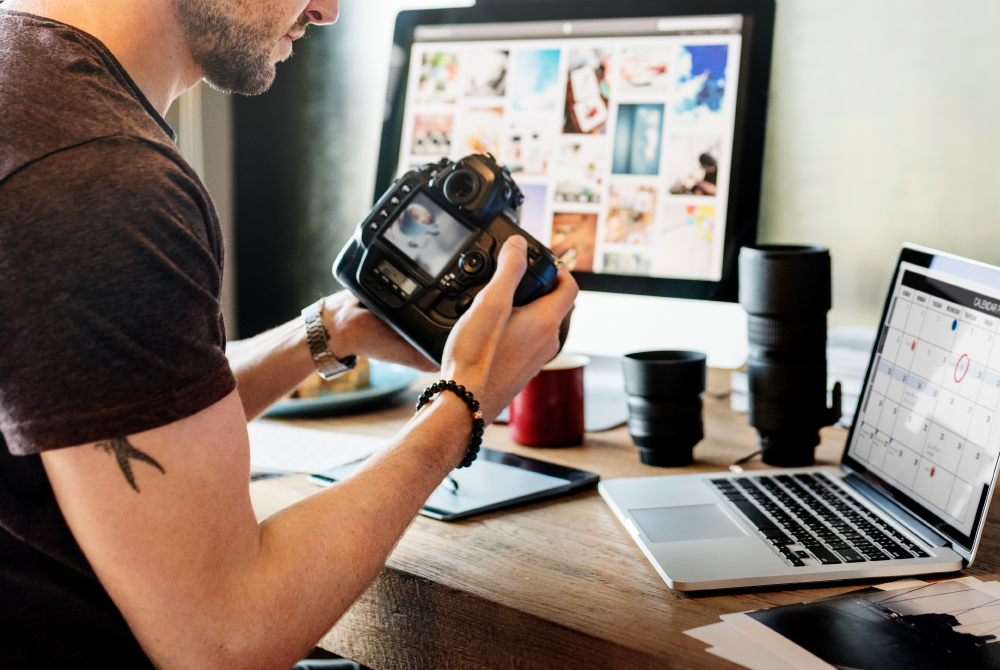“Learn how to streamline your photo studio operations and boost productivity with Essential Studio Manager.”
In the vibrant world of photography, a photo studio manager plays a crucial role. From ensuring smooth operations to managing client relationships, the responsibilities are diverse and demanding. If you’re stepping into this role or seeking to optimize your studio’s efficiency, this guide will provide you with everything you need to know.
What is a Photo Studio Manager?

A photo studio manager oversees the daily operations of a photography studio. This role requires a blend of administrative skills, creativity, and technical knowledge. Responsibilities range from scheduling shoots and managing staff to handling finances and marketing efforts. A studio manager ensures that photographers, assistants, and other staff members can focus on their creative tasks without being bogged down by operational issues.
Key Responsibilities of a Photo Studio Manager
Scheduling and Coordination
Managing a studio involves intricate scheduling. You need to coordinate bookings to ensure that there are no overlaps. This requires a deep understanding of the studio’s capacity and the duration needed for different types of shoots. Tools like Essential Studio Manager can simplify this process, providing a clear overview of your calendar and helping to avoid conflicts.
Staff Management
A photo studio manager oversees hiring, training, and supervising staff. This includes photographers, assistants, and administrative personnel. Ensuring that everyone is on the same page and working harmoniously is key to maintaining a productive environment.
Client Relations
Building and maintaining strong relationships with clients is vital. From initial inquiries to final deliveries, a studio manager ensures that clients have a seamless experience. This involves clear communication, addressing any concerns promptly, and delivering on promises.
Financial Management
Handling the studio’s finances is another critical aspect. This includes budgeting, invoicing, and tracking expenses. Using financial management tools can streamline these tasks, allowing you to focus more on strategic planning and less on number crunching.
Marketing and Promotion
Promoting the studio is essential for attracting new clients. A photo studio manager needs to be adept at using social media, email marketing, and other promotional strategies. Showcasing your studio’s work, engaging with potential clients, and keeping your audience updated with the latest offerings can drive growth.
Tools to Enhance Your Efficiency

Essential Studio Manager
Essential Studio Manager is a comprehensive tool designed to simplify the administrative tasks of running a photo studio. It offers features like scheduling, client management, invoicing, and reporting. By integrating this tool into your workflow, you can save time, reduce errors, and focus more on the creative aspects of your business.
Benefits of Using Essential Studio Manager
Streamlined Scheduling
With Essential Studio Manager, you can easily schedule shoots, avoid double bookings, and manage your calendar efficiently. The platform provides a clear view of your schedule, helping you plan better and avoid conflicts.
Efficient Client Management
Essential Studio Manager allows you to manage client information, track communication, and keep records organized. This ensures that you can quickly access client details, follow up on leads, and maintain strong relationships.
Hassle-Free Invoicing
Creating and managing invoices can be time-consuming. Essential Studio Manager automates this process, generating professional invoices and tracking payments. This not only saves time but also ensures accuracy and helps maintain a steady cash flow.
Detailed Reporting
Understanding your studio’s performance is crucial for growth. Essential Studio Manager offers detailed reporting features, providing insights into your bookings, revenue, and other key metrics. This data can inform your decisions and help you strategize effectively.
Essential Skills for a Photo Studio Manager

Organizational Skills
A photo studio manager must be highly organized. From scheduling shoots to managing supplies, an organized approach ensures that everything runs smoothly. This includes maintaining a clean and efficient workspace, managing equipment, and keeping track of ongoing projects.
Communication Skills
Effective communication is vital in managing a studio. You need to convey instructions to your team clearly, negotiate with clients, and handle any issues that arise. Good communication fosters a positive working environment and ensures that everyone is on the same page.
Financial Acumen
Understanding financial management is crucial. This includes budgeting, pricing services, and managing expenses. A studio manager needs to ensure that the studio remains profitable while offering competitive pricing to clients.
Technical Knowledge
A solid understanding of photography and the equipment used in the studio is essential. This allows you to assist with technical issues, manage equipment, and ensure that your team has everything they need to deliver high-quality work.
Challenges Faced by Photo Studio Managers
Managing Diverse Client Needs
Clients come with varying expectations and requirements. A studio manager needs to be adaptable, understand each client’s unique needs, and ensure that the studio can meet them.
Keeping Up with Industry Trends
The photography industry is constantly evolving. Staying updated with the latest trends, technologies, and techniques is essential for keeping your studio competitive.
Balancing Creativity and Business
A photo studio manager needs to strike a balance between creative and business aspects. While fostering a creative environment is important, ensuring that the studio operates efficiently and profitably is equally crucial.
Tips for Aspiring Photo Studio Managers
Stay Organized
Use tools like Essential Studio Manager to keep track of your schedule, clients, and finances. This will help you stay on top of your tasks and avoid any last-minute hassles.
Build Strong Relationships
Cultivate strong relationships with clients and staff. Happy clients are more likely to return and refer others, while a motivated team is more productive and creative.
Continuously Learn
Invest in your professional development. Attend workshops, read industry publications, and network with other professionals to stay updated and improve your skills.
Focus on Customer Service
Exceptional customer service can set your studio apart. Always strive to exceed client expectations and address any issues promptly and professionally.
Conclusion
Being a photo studio manager is a multifaceted role that requires a blend of organizational, communication, and technical skills. By leveraging tools like Essential Studio Manager, you can streamline your operations, enhance client relationships, and drive your studio’s success. Stay organized, continuously improve your skills, and focus on providing exceptional service to thrive in this dynamic industry.
FAQs
What does a photo studio manager do?
A photo studio manager oversees the daily operations of a photography studio. This includes scheduling shoots, managing staff, handling finances, and maintaining client relationships.
What skills are essential for a photo studio manager?
Key skills include organizational skills, communication skills, financial acumen, and technical knowledge of photography and equipment.
How can Essential Studio Manager help in managing a photo studio?
Essential Studio Manager offers features like streamlined scheduling, efficient client management, hassle-free invoicing, and detailed reporting. These tools help save time, reduce errors, and enhance overall efficiency.
How can I improve my skills as a photo studio manager?
Stay organized, build strong relationships, continuously learn, and focus on providing exceptional customer service. Use tools like Essential Studio Manager to streamline administrative tasks.
What are the challenges faced by photo studio managers?
Challenges include managing diverse client needs, keeping up with industry trends, and balancing creativity with business operations.




